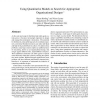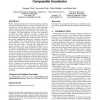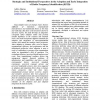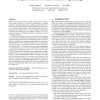717 search results - page 141 / 144 » Efficient operating system support for group unicast |
AAMAS
2008
Springer
13 years 7 months ago
2008
Springer
As the scale and scope of distributed and multi-agent systems grow, it becomes increasingly important to design and manage the participants' interactions. The potential for b...
CASES
2010
ACM
13 years 5 months ago
2010
ACM
Mobile computing platforms in the form of smart phones, netbooks, and personal digital assistants have become an integral part of our everyday lives. Moving ahead to the future, m...
HICSS
2007
IEEE
14 years 1 months ago
2007
IEEE
Using multiple lenses of strategic choice theories (diffusion of innovation, organizational innovativeness) and institutional theory as the basis and reflecting data from semi-str...
LICS
1994
IEEE
13 years 11 months ago
1994
IEEE
The modal mu-calculus is an expressive logic that can be used to specify safety and liveness properties of concurrent systems represented as labeled transition systems (LTSs). We ...
PPOPP
2010
ACM
13 years 9 months ago
2010
ACM
Helper locks allow programs with large parallel critical sections, called parallel regions, to execute more efficiently by enlisting processors that might otherwise be waiting on ...




